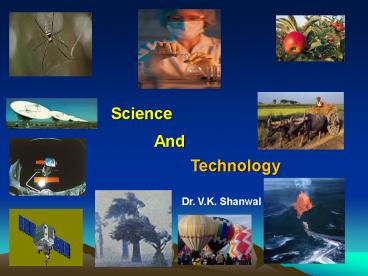Science - PowerPoint PPT Presentation
Title:
Science
Description:
Science And Technology Dr. V.K. Shanwal What is science? Science is a tool. Medicine: I have high cholesterol, what should I do? Take cholesterol lowering ... – PowerPoint PPT presentation
Number of Views:172
Avg rating:3.0/5.0
Title: Science
1
Science
And
Technology
Dr. V.K. Shanwal
2
What is science?
Science seeks to understand the natural world.
- Science is a tool.
- Medicine I have high cholesterol, what should I
do? - Take cholesterol lowering medication.
- Consult your astrologer.
- Pray to the god Baal and sacrifice a goat.
3
- The word science comes from the Latin "scientia,"
meaning knowledge. - How do we define science? According to Webster's
New Collegiate Dictionary, the definition of
science is "knowledge attained through study or
practice," or "knowledge covering general truths
of the operation of general laws, esp. as
obtained and tested through scientific method
and concerned with the physical world."
4
- What does that really mean? Science refers to a
system of acquiring knowledge. - This system uses observation and experimentation
to describe and explain natural phenomena. The
term science also refers to the organized body of
knowledge people have gained using that system.
5
- In simple words, the word science often describes
any systematic field of study or the knowledge
gained from it. - What is the purpose of science? Perhaps the most
general description is that the purpose of
science is to produce useful models of reality.
6
- Science as defined above is sometimes called pure
science to differentiate it from applied science,
which is the application of research to human
needs. Fields of science are commonly classified
along two major lines - Natural sciences,
the study of the natural world, and - Social
sciences, the systematic study of human behavior
and society.
7
Technology?
- technology tek-nol-uh-jee
- noun1.the branch of knowledge that deals with
- the creation and use of technical means and
- their interrelation with life,
society, and the environment, drawing upon such
- subjects as industrial arts, engineering, appl
ied science, - and pure science.
8
- 2.the terminology of an art, science, etc.
technicalnomenclature. - 3.a technological process, invention,
- method, or the like.
- 4.the sum of the ways in which social
groups provide themselves with the material - objects of their civilization.
9
What is Technology?
- It is the innovation, change, or modification of
the natural environment in order to satisfy
perceived human wants and needs. (Standards for
Technological Literacy, ITEA, 2000) - The goal of technology is to make modifications
in the world to meet human needs. (National
Science Education Standards, NRC, 1996)
10
- In the broadest sense, technology extends our
abilities to change the world to cut, shape, or
put together materials to move things from one
place to another to reach farther with our
hands, voices, and senses. (Benchmarks for
Science Literacy, AAAS, 1993) - Technology is the process by which humans modify
nature to meet their needs and wants.
(Technically Speaking Why All Americans Need to
Know More About Technology, NAE/NRC, 2002)
11
Evolution and Communication of Science and
Technology
12
Science vs. Technology
Deals with how humans modify, change, alter, or
control the natural world. Is very concerned with
what can or should be designed, made, or
developed from natural world materials and
substances to satisfy human needs and wants
Deals with the natural world. Is very concerned
with what is (exists) in the natural world.
(i.e. Biology, Chemistry, Physics, Astronomy,
Geology, etc.)
13
Steps of the Scientific Method
14
What is scientific method? The scientific method
is a tool that helps scientists and the rest of
us to solve problems and determine answers to
questions in a logical format. It provides
step-by-step, general directions to help us work
through problems.
15
Scientists over the centuries faced the same
problem when it came to sorting out the truth
from non truths. To solve the problem, they
devised a methodical framework within which to
work. This framework is called the scientific
method, and it's extremely important to solve a
problem.
A scientist often credited with being the first
to employ the scientific method is Francesco
Redi, an Italian physician who lived from 1626
until 1697.
Scientific method requires intelligence,
imagination, and creativity.
16
- The Scientific Method involves a series of steps
that are used to investigate a natural
occurrence.
17
Steps to the scientific method
- Identify a problem.
- Research the problem.
- Formulate a hypothesis.
- Conduct an experiment.
- Reach a conclusion.
18
Scientific method
19
problem ??? pen torch doesn't work
You think back to the last time your pen torch
didn't work, and you remember that it was because
of worn-out batteries.
You guess that worn-out batteries is the reason
this time as well
So you get some new batteries from the drawer
next to your bed and replace the ones in your pen
torch.
Oh! pen torch works. finished the great book !
20
(No Transcript)
21
Solving a Problem
- Identify a Problem
- State Observations about the problem
- Form a Hypothesis about the problem (ifthen)
- Design an Experiment to test the hypothesis
- Collect Data
- Form a Conclusion
- Retest































